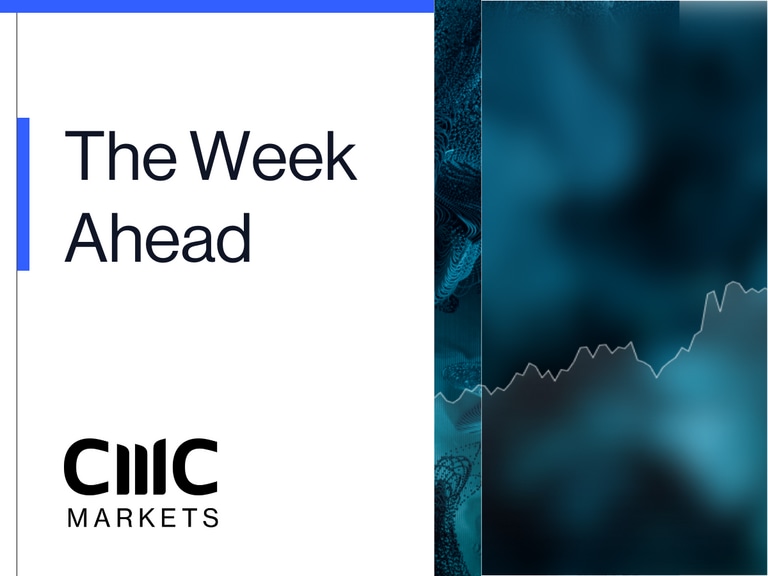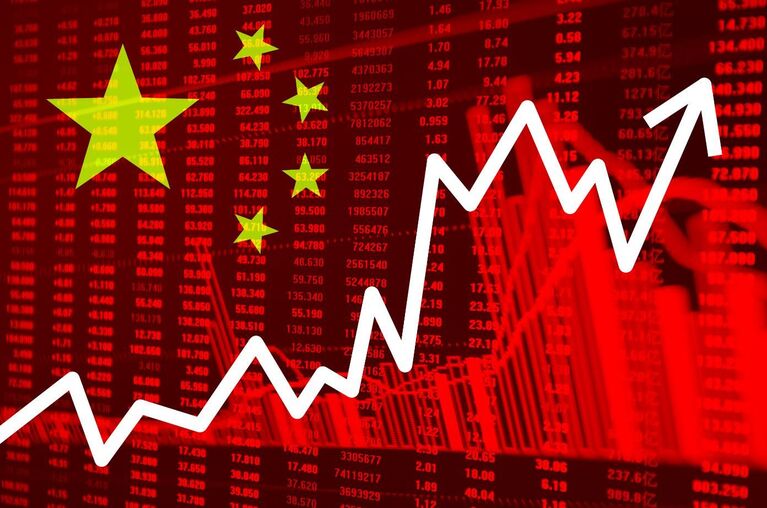
Read our pick of the top stories to look out for this week (6 to 10 September), and view our key company earnings schedule.
In this week's video, Michael looks back at another positive month for stocks. He also looks ahead to this week's ECB rate meeting, and at the outlook for the US dollar, and the latest UK economic data.
China trade balance (August)
TUE 7: Recent data from Germany showed that exports to China fell to a one-year low, indicating that the world’s second-largest economy was experiencing a slowdown in domestic demand. In July, Chinese exports rose at their slowest rate this year (19.3%), well down from the 32.2% rise in June. Imports also rose at their slowest rate in 2021, rising 28.1%, down from 36.7% in June. These are still high numbers, but need to be set in the context of the pandemic-induced slump in the global economy through 2020. The various disruptions at China’s ports, as well as throughout the country, in the last month or so are also likely to disrupt how much economic activity took place in August – a trend we saw play out in the latest PMI readings, which slipped into contraction. Chinese exporters have also had to contend with supply chain bottlenecks, higher costs, and component shortages, which along with factory shutdowns in other parts of the world are likely to have impacted demand. With US demand also slowing in the form of falling consumer confidence, this week’s trade numbers could introduce a downside surprise. Exports are expected to rise by 17%, while imports are expected to rise by 27%.
Ted Baker Q2 trading update
TUE 7: In July, Ted Baker reported full-year results that painted a bleak picture as far as losses are concerned; however, the numbers were still better than expected. Revenue declined 44.2% to £350.2m while losses before tax rose to £107.7m, up from a loss of £77.6m in 2020. The one bright spot was ecommerce sales, which rose 22% to £144.9m with ecommerce channels seeing growth of 30.2%. The company also provided an update on current trading and here the pattern was the same, with ecommerce the only growth area, as Covid-19 restrictions impacted sales in the UK, Europe, and Canada, with Q1 revenue down 19.9%. The outlook appears much more encouraging than in February, with ecommerce margins rising 250bps while the deals signed earlier this year in the Middle East with Al-Futtaim, to cover the likes of Qatar, UAE, Bahrain, and Saudi Arabia, are expected to offer an additional uplift
Dunelm Group full-year results
WED 8: When Dunelm reported its Q4 numbers back in July, the share price reaction was a little disappointing. Dunelm has been one of the few UK retailers that has managed to adapt well to the pandemic, and total sales rose 101.7% year on year to £380.1m. While the gain in the July numbers can partly be put down to the fact that all the stores had reopened, compared to the same period last year, on a two-year basis, pre-pandemic, it was still an increase of 43.9%. Margins have also improved, rising by 460bps compared to the same quarter a year ago, with management revising up their full-year profit forecasts to £158m, from £125m, although costs could see an increase due to supply chain disruptions.
GameStop Q2 results
WED 8: Do the fundamentals really matter for a stock that has seen huge amounts of volatility since the middle of January? Short interest has reduced markedly from the beginning of the year, when it was just shy of 71.2m shares at the end of 2020, to levels of 7.5m now. Away from the noise that has dominated the discourse around this company, GameStop has been struggling for some time with falling sales because of online game stores cannibalising its market share. Quite simply, mall shopping isn’t anywhere near as profitable at a time when ordering games can be done at the click of a mouse and downloaded straight to your computer or console without the need for a physical disc. Reddit day traders appear to have taken it upon themselves to come to the rescue of a tired brand, which is in desperate need of rejuvenation in the digital age.
The company has taken steps to address this by bringing in several names from Amazon and Walmart, while Ryan Cohen became chairman on 9 June, charged with turning the business around. GameStop has already closed hundreds of stores in response to this changing dynamic, with the Covid-19 pandemic accelerating this process. And while all the free publicity helped boost its Q1 numbers by 25% to $1.28bn and cut losses to $0.45c a share, the company still faces a long road back. New CEO Cohen will need to convince people that it’s not enough to just cut costs to sustain a tired business model, but he will also have to turn around a model where revenues have been in decline since 2018. The company has certainly bought itself more time by selling an extra 5m shares in June, and raising another $1.1bn in the process, on top of the $551m it raised in April. Now it needs to start making money, though even if it doesn’t, that probably won’t be enough to stop its shares going higher. After all, down is the new up these days, where meme stocks are concerned. Losses are expected to come in at $0.56c a share.
Morrisons half-year results
THU 9: With all the M&A chatter surrounding Morrisons in recent weeks, attention will shift to this week’s first-half trading update as the wider markets get a peek under the bonnet of the actual business itself. While most of the talk has been about the value of its assets and low debt levels, there is also a decent business underneath. Although it’s a competitive market, with the UK’s fourth-largest supermarket squeezed between the likes of Tesco and Sainsbury’s and the young upstarts, Aldi and Lidl. In May, the company saw Q1 total sales rise by 5.3%, with online sales showing an increase of 113%, while fuel sales were back to levels last seen pre-pandemic. The deal with Amazon appears to be paying dividends, as does the wholesale business, which is benefitting from the new McColl’s stores that are now being supplied. In terms of full-year profits, these are expected to be modestly higher than last year’s would have been, but for the £230m repayment of business rates money, at $435m. As we look towards Q2 and the half-year period, while sales may have seen a boost because of Euro 2020, there is the prospect that, as the UK economy started its reopening process, sales growth is likely to see a slowdown. According to Kantar in the 12 weeks to 8 August, like-for-like sales were down 6.2% on 2020 levels. While this is a big drop, sales are still higher than they were pre-pandemic, with Morrisons’ market share unchanged at 10.1%.
European Central Bank rate meeting
THU 9: The last ECB meeting in July was every bit as uninteresting as we expected it to be. Having announced a change to its inflation mandate to try and give itself more flexibility over monetary policy in July, the discussion is likely to move onto the future of the ECB’s PEPP asset purchase program. The new mandate will allow the central bank to tolerate temporary inflation overshoots to its policy target, and in turn prevent policy mistakes like when the ECB raised rates in 2008 and 2011. As far as the PEPP program is concerned, it is due to run to at least March 2022. However, there appears little agreement amongst council members with respect to pushing the date further out. The recent sharp rise in headline CPI to 3% is also likely to sharpen the debate over a PEPP extension, with the more hawkish members starting to make more noise. The floods in Germany may mean that an extension to September 2022 may be more likely, but with CPI surging higher it doesn’t seem likely. The slowing nature of the recovery might become a factor. Not to mention the damage caused by the wildfires in Greece, Italy, and France in August. There has been talk that the PEPP might see an increase; however, this now looks unlikely and would be highly problematic ahead of the German elections, which take place at the end of the month, on 26 September.
FuelCell Energy Q3 results
THU 9: For a company that has not turned a profit since 1997, it is perhaps surprising that FuelCell’s share price surged over 2,800% during 2020, before peaking earlier this year, just above $29. The shares of this clean energy company are still well below levels seen five years ago, and even at its current valuation, FuelCell Energy still shows little indication that they will ever turn a profit. It’s even harder to compute that twenty years ago the share price of this business was sitting at the stratospheric heights of $7,800. While the valuation of the business has become more realistic since then, if the last five years are any indication, it remains further away from making a profit now than it did in 2,000. Revenues last year came in at $70.9m. In Q2 the company reported revenues of $14m, down from $18.9m a year ago, while operational losses rose to $17.4m. The company said it hoped to be able to grow revenues by bringing new projects online in the coming months. Certainly a noble sentiment, but when your revenues are still well below 2016 levels, you must wonder when and how that will happen. It certainly feels like a ‘jam tomorrow’ type of company, especially with a valuation of over $2bn. Losses are expected to come in at $0.06c a share.
UK GDP (July)
FRI 10: Monthly GDP in June saw a decent gain of 1%, up from a 0.6% gain in May. With the UK economy seeing all remaining restrictions removed in July, we should expect another positive month, even if we don’t see quite the same level of strength. There is no doubt that the UK economy is continuing to improve; however, economic activity is likely to have been impacted by the so-called ’pingdemic’, which caused large swathes of the workforce to self-isolate due to being pinged by the NHS Track and Trace app. Expectations are for July GDP to increase by 0.8%, with the 3-month figure slipping back from 4.8% to 3.8%.
UK industrial & manufacturing production (August)
FRI 10: When compared to the recent purchasing managers’ index (PMI) numbers, industrial and manufacturing production numbers have been weak, to say the least. This isn’t too surprising given that the PMI numbers don’t cover important sectors like auto production. In July, UK car production slumped to its worst levels since 1956, which suggests that this week’s August manufacturing production numbers will be similarly disappointing. Various UK automakers have already announced production slowdowns, due to shortages of important parts. In July, both industrial production and manufacturing production came in weaker than expected, with industrial production sliding -0.7%, while manufacturing production rose by 0.2%. There is little to suggest we won’t see similar lacklustre readings for August too, given that a lot of manufacturing capacity will see the same problems that they reported in July roll into August.
US producer price index (August)
FRI 10: At the last set of US PPI numbers, we saw factory gate inflation hit a new high of 7.8% in July, with little sign of any abatement given the various supply chain disruptions that have continued to be reported through August Rising freight rates, higher raw material costs, as well as worker shortages, are creating choke points across the whole global supply chain. At some point these price pressures will start to trickle down into company profit margins, and into consumer prices, then we could start to see upward pressure on wages as consumers see their purchasing power eroded. This week’s US PPI numbers will be an added indicator as to whether these price pressures are showing signs of abating or have further to go. Expectations are for August PPI to rise by 8.3%, with core prices rising 6.6%, up from 6.2%.
Index dividend schedule
Dividend payments from an index's constituent shares can affect your trading account. View this week's index dividend schedule
Selected company results
| Monday 6 September | Results |
| Dechra Pharmaceuticals (UK) | Full-year |
| HgCapital Trust (UK) | Q2 |
| Mattioli Woods (UK) | Full-year |
| Tuesday 7 September | Results |
| Bango (UK) | Half-year |
| Cairn Energy (UK) | Half-year |
| Casey's General Stores (US) | Q1 |
| Coupa Software (US) | Q2 |
| IQE (UK) | Half-year |
| Fisher James (UK) | Half-year |
| Luceco (UK) | Half-year |
| McBride (UK) | Full-year |
| MeridianLink (US) | Q2 |
| Midwich Group (UK) | Half-year |
| Nucleus Financial (UK) | Half-year |
| Pebble Group (UK) | Half-year |
| Smartsheet (US) | Q2 |
| Ted Baker (UK) | Q2 |
| TP ICAP (UK) | Half-year |
| UiPath (US) | Q2 |
| Vistry Group (UK) | Half-year |
| Wednesday 8 September | Results |
| Bakkavor Group (UK) | Half-year |
| Calavo Growers (US) | Q3 |
| Couchbase (US) | Q2 |
| Dunelm (UK) | Full-year |
| FuelCell Energy (US) - TBC | Q3 |
| GameStop (US) | Q2 |
| Gamma Communications (UK) | Half-year |
| Genius Sports (UK) | Q2 |
| HealthEquity (US) | Q2 |
| Impact Healthcare Reit (UK) | Half-year |
| Inspecs Group (UK) | Q2 |
| SentinelOne (US) | Half-year |
| Thursday 9 September | Results |
| Affirm Holdings (US) | Q4 |
| Burford Capital (US) | Half-year |
| Capital & Regional (UK) | Half-year |
| Computacenter (UK) | Half-year |
| Curtis Banks Group (UK) | Half-year |
| EMIS Group (UK) | Half-year |
| Funding Circle Holdings (UK) | Q2 |
| Go-Ahead Group (UK) | Full-year |
| Jadestone Energy (UK) | Q2 |
| Lakeland Industries (US) | Q2 |
| Morrisons (UK) | Half-year |
| Secure Income REIT (UK) | Half-year |
| STV Group (UK) | Half-year |
| Sumo Logic (US) | Q2 |
| Zscaler (US)Q4 | Q4 |
| Friday 10 September | Results |
| No major announcements |
Company announcements are subject to change. All the events listed above were correct at the time of writing.
Disclaimer: CMC Markets is an execution-only service provider. The material (whether or not it states any opinions) is for general information purposes only, and does not take into account your personal circumstances or objectives. Nothing in this material is (or should be considered to be) financial, investment or other advice on which reliance should be placed. No opinion given in the material constitutes a recommendation by CMC Markets or the author that any particular investment, security, transaction or investment strategy is suitable for any specific person. The material has not been prepared in accordance with legal requirements designed to promote the independence of investment research. Although we are not specifically prevented from dealing before providing this material, we do not seek to take advantage of the material prior to its dissemination.






















